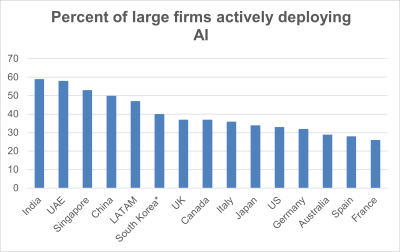Are Canadian firms adopting artificial intelligence fast enough?
Peter Josty is Executive Director of the Centre for Innovation Studies in Canada
AI has the potential to improve Canada’s poor productivity performance. But are Canadian firms adopting AI fast enough?
AI is a General Purpose Technology (GPT). GPTs are a special class of innovations that make transformational change across the whole economy. Other GPTs include electricity, steam power and computers. They are innovations that have so many applications they get adopted throughout the economy and become pervasive.
We should expect that AI will become as widespread and commonplace as electricity or computers in the next few decades.
How do new technologies get adopted?
Typically, new technologies get adopted according to an S-shaped curve. A classic example is shown in the diagram below, of adoption of hybrid corn in Iowa.
.png)
Source: Everett Rogers, Diffusion of Innovations
Another way of looking at AI adoption by firms is an approach used by Edmonton-based Amii (Alberta Machine Intelligence Institute): the “AI adoption spectrum,” shown in the diagram below.
.png)
Which sectors of the economy are using AI most?
A complication in answering this question is that there are many different kinds of AI, and different ways of classifying them. A classification used by IBM lists seven different kinds of AI:
- Speech recognition
- Machine learning
- Deep learning
- Virtual representation
- Natural language generation
- Decision management
- Biometrics.
A recent report by Statistics Canada asked Canadian businesses if they were using generative AI (natural language generation). The table below shows the percentage of firms in each industry that are already using generative AI, such as ChatGPT, looking at the top and bottom four industries.
Information and Cultural Industries | 24.1 |
Professional, Scientific and Technical | 18.8 |
Finance and Insurance and Insurance | 16.9 |
Real Estate & Rental & Leasing | 13.7 |
|
|
Accommodation and Food Services | 5.9 |
Construction | 5.5 |
Agriculture, Forestry, Fishing & Hunting | 5.5 |
Transportation and Warehousing | 4.7 |
Wholesale Trade | 3.8 |
The highest adoption rates were found in Information and Cultural Industries, and in Professional, Scientific and Technical Services, while the lowest rates were in Wholesale Trade and Transportation and Warehousing.
A survey by KPMG Canada of companies with revenue of $500 million or higher found that only 35 percent of Canadian companies use AI in their operations, compared with 72 percent of American firms. They didn’t ask what kind of AI they were using.
Barriers to adopting AI
According to the same survey from KPMG Canada, the main barriers to Canadian firms adopting AI and preventing organizations from using AI effectively are lack of skilled talent and quality data to train AI algorithms. Nearly half (47 percent) of Canadian businesses said they lack the in-house expertise to validate and verify the accuracy of their AI algorithms, and more than four in 10 (44 percent) said their data sets are either too small or too big, are missing data, are incorrect or not properly formatted.
Comparing Canadian businesses internationally
Large firms in Canada are in the middle of the pack in actively deploying AI compared with 14 other countries, according to the IBM Global AI Adoption Index 2023. This index surveys large companies with over 1,000 employees and does not distinguish the different types of AI.

Source: adapted from IBM
Examples of Canadian firms using ChatGPT
A story by the Canadian Press gave these examples of how Canadian firms are using ChatGPT:
- BlackBerry Ltd - cybersecurity
- Lightspeed Commerce Inc. - to enhance menus and restaurant sales.
- Magna International Inc. – an environment where staff can explore potential AI use cases.
- Royal Bank of Canada - to recommend personalized monthly budgets to customers based on their individual spending habits.
- Shopify Inc. - a suite of AI tools that can write product descriptions, email subject lines and headings for online stores.
- Sun Life Financial Inc. - to help developers code faster and more accurately
Impact of AI on productivity
AI hasn’t yet made much of an impact on Canada’s productivity statistics. This is not surprising. In the 1970s, Nobel Prize-winning American economist Robert Solow noted: “You can see the computer age everywhere but in the productivity statistics.” This idea became known as the Solow productivity paradox. The reason is that it takes a long time for new technologies to percolate through the economy and eventually improve productivity.
Federal support program saw little uptake
The Canada Digital Adoption Program was launched in 2022 with a budget of $4 billion and a plan to help 160,000 businesses adopt digital technologies, including AI. The program was closed in February 2024.
According to an article in Policy Options the closure was caused by a low uptake due to the program’s complexity and rigidity and reliance on a limited list of consultants. It had spent less than one-fifth of its budget.
Conclusion
Adoption and use of AI is a complicated and rapidly changing situation. We can say some things with a reasonable certainly:
- Large Canadian companies are doing adequately in adopting AI, at least compared with 14 other countries.
- Canadian firms are adopting AI slower than U.S. firms.
- AI will probably not have much of an impact on productivity statistics for some time, possibly several years or a decade or more.
- There is a need for a well-designed government program to support firms in adopting AI.
R$
Events For Leaders in
Science, Tech, Innovation, and Policy
Discuss and learn from those in the know at our virtual and in-person events.
See Upcoming Events
You have 0 free articles remaining.
Don't miss out - start your free trial today.
Start your FREE trial Already a member? Log in
By using this website, you agree to our use of cookies. We use cookies to provide you with a great experience and to help our website run effectively in accordance with our Privacy Policy and Terms of Service.





.png)